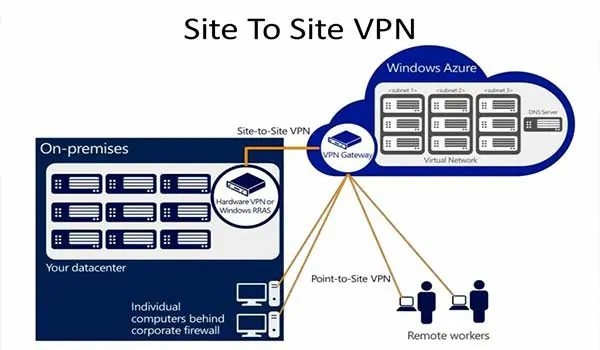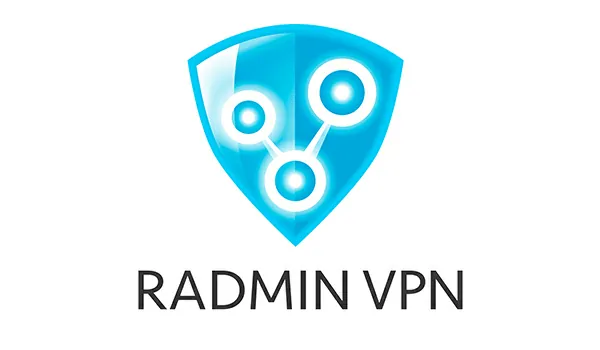VPNs (Virtual Private Networks) are crucial tools for secure communication between networks or devices over the internet. There are two popular types of VPN configurations: site-to-site VPN and point-to-site VPN, which serve different functions for organizations and people.
Site-to-Site VPN

A Site-to-Site VPN joins many networks from various places, such as branch offices or data centers, to form a single, private network. This form of VPN is often used by enterprises to facilitate secure communication and resource sharing across numerous offices. It works by creating a secure tunnel between each site’s routers or gateways, allowing for continuous data transmission without requiring individual devices to setup a VPN connection.
Key Features of Site-to-Site VPNs:
Ideal for linking several offices.
Offers secure communication for network-wide access.
Effective for enterprises with big, scattered networks.
Point-to-Site VPN

A Point-to-Site VPN connects individual devices (such as laptops or smartphones) to a private network, usually a corporate or home network, from a remote location. This form of VPN is ideal for remote workers, freelancers, or anybody who need safe access to network resources when away from their primary location. Each device creates a secure connection with the network.
Key Features of a Point-to-Site VPN:
Suitable for solitary users or small teams.
Every connected device must have a VPN client installed.
Ideal for distant work and accessing personal networks.
Both Site-to-Site and Point-to-Site VPNs provide safe access to private networks, although they serve distinct purposes. Site-to-Site VPNs excel in inter-network communication for enterprises, whereas Point-to-Site VPNs are designed for single device access. The best VPN option for you is determined by your individual connection and security needs.
What is a VPN point?
A VPN point is an endpoint in a Virtual Private Network (VPN) connection. It is simply a gateway or node that allows for secure communication between devices or networks via the internet. VPN points are critical for creating and maintaining encrypted tunnels for data transport.
VPN points are classified into two kinds based on the connection type:
1. VPN endpoint for point-to-site connections
In a Point-to-Site VPN, the VPN point is the network gateway or server to which each device connects. The device (such as a laptop or smartphone) serves as the client, while the VPN point serves as the destination, granting access to the private network.
A remote worker’s laptop connects to a company’s VPN point, allowing them to securely access internal resources such as files or databases.
2. VPN endpoint for site-to-site connections
A Site-to-Site VPN has VPN points at both ends of the connection. These are usually routers or firewalls that act as gateways between the two networks being connected.
For example, a company headquarters and a branch office each have VPN points that allow data to be securely exchanged across the networks.
What is the difference between site-to-site VPN and point to site VPN?
Both Site-to-Site VPN and Point-to-Site VPN provide secure internet connection, but their purposes, configurations, and use cases differ dramatically.
1. Connection Type
Site-to-Site VPN connects many networks, such as corporate office sites, to create a single network.
For example, connecting a company’s headquarters with branch offices.
Point-to-Site VPN connects individual devices, such as computers and cellphones, to a private network.
Remote workers, for example, may access their company’s network from home or while on the road.
2. User Base.
Site-to-Site VPN is ideal for enterprises with many sites that require secure connection across their networks.
Point-to-Site VPN provides safe access to a private network for remote employees or freelancers.
3. Configuration
Site-to-Site VPNs are configured at the gateway level, rather than on individual devices. Examples include routers and firewalls.
Point-to-Site VPN requires installing and configuring a VPN client on each device.
4. Scalability.
Site-to-Site VPN is ideal for large-scale application, linking whole workplace networks and enabling many devices with little configuration.
Point-to-Site VPN scales with users, but needs configuration on each device, making it less suitable for big networks.
5. Common use cases
Site-to-site VPN:
Secure interoffice communication.
Access to centralized resources for all networked devices.
Connecting data centers or cloud environments with physical offices.
Point-to-site VPN:
Individual workers can access information remotely.
Secure browsing over public Wi-Fi.
Using personal or home networks when traveling.
Summary Table
| Aspect | Site-to-Site VPN | Point-to-Site VPN |
|---|---|---|
| Connection | Network-to-network | Device-to-network |
| Configuration | Gateway-level | Individual device-level |
| Scalability | Large scale (multiple devices) | Smaller scale (individual users) |
| Common Users | Businesses and organizations | Remote workers or individuals |
| Typical Use | Inter-office connectivity | Remote network access |
What is the best site-to-site VPN?
The ideal site-to-site VPN is determined by your individual requirements, including scalability, security, price, and interaction with current infrastructure. Here are some of the highest-rated alternatives for site-to-site VPN solutions:
1. Cisco AnyConnect VPN.

Why It Is Great: Cisco is noted for its dependability and enterprise-level security. Its routers and firewalls provide extensive support for site-to-site VPN connections.
Key features:
High-speed encryption ensures safe connections.
Advanced routing capabilities.
Scalability for huge organizations.
Ideal for medium to big enterprises that value security and substantial assistance.
2. Palo Alto Networks GlobalProtect.

Why It Is Great: Palo Alto Networks, renowned for its complete cybersecurity solutions, offers safe and scalable site-to-site VPN choices.
Key features:
Integrated threat prevention.
Cloud-based administration solutions.
Support for hybrid cloud deployments.
Ideal for enterprises that want both VPN and enhanced cybersecurity measures.
3. Fortinet FortiGate.

Why It Is Great: Fortinet provides high-performance site-to-site VPN solutions that may be easily integrated into existing networks.
Key features:
Integrated firewall and threat detection.
Advanced encryption techniques.
User-friendly interface.
Ideal for businesses seeking cost-effective and secure solutions.
4. OpenVPN.

Why It Is Great: OpenVPN is a versatile, open-source solution that works for enterprises of all sizes.
Key features: Highly configurable.
Robust encryption techniques.
Affordable for small and medium-sized enterprises.
Ideal for: Organizations with technological competence that need a flexible and cost-effective VPN.
5. Amazon Web Services (AWS VPN).

Why It Is Great: AWS offers trustworthy cloud-based site-to-site VPN solutions that are perfect for hybrid cloud setups.
Key feature: Integration with other AWS services.
Very secure connections.
Scalable to accommodate increasing enterprises.
Ideal for companies currently using AWS infrastructure.
6. Microsoft Azure VPN gateway.

Why It Is Great: Microsoft Azure’s site-to-site VPN solution is fully integrated with Azure cloud services.
Key features:
Excellent availability and redundancy.
Supports many VPN protocols.
simplifies hybrid cloud connectivity.
Ideal for businesses that use Microsoft Azure for cloud services.
7. Sophos XG Firewall.

Why It Is Great: Sophos provides a safe and simple site-to-site VPN via its XG Firewall platform.
Key features:
Simple set-up and configuration.
Advanced monitoring tools.
Built-in security features.
Ideal for small and medium-sized organizations seeking simplicity and security.
Important Factors to Consider When Choosing:
Security: Look for VPNs that use strong encryption technologies (such as IPsec and SSL).
Performance: Choose a system with low latency and fast connectivity.
Scalability: Make sure the VPN can expand to meet your business’s demands.
Compatibility: Make sure it works with your existing gear, software, or cloud services.
Cost: Match your budget to the features you require.
Final recommendation
Cisco AnyConnect and Palo Alto Networks GlobalProtect are outstanding security and scalability options for large companies.
OpenVPN and Fortinet FortiGate provide excellent flexibility and value for small enterprises and budget-conscious customers.
If you rely on cloud infrastructure, AWS VPN or Microsoft Azure VPN Gateway are ideal.



